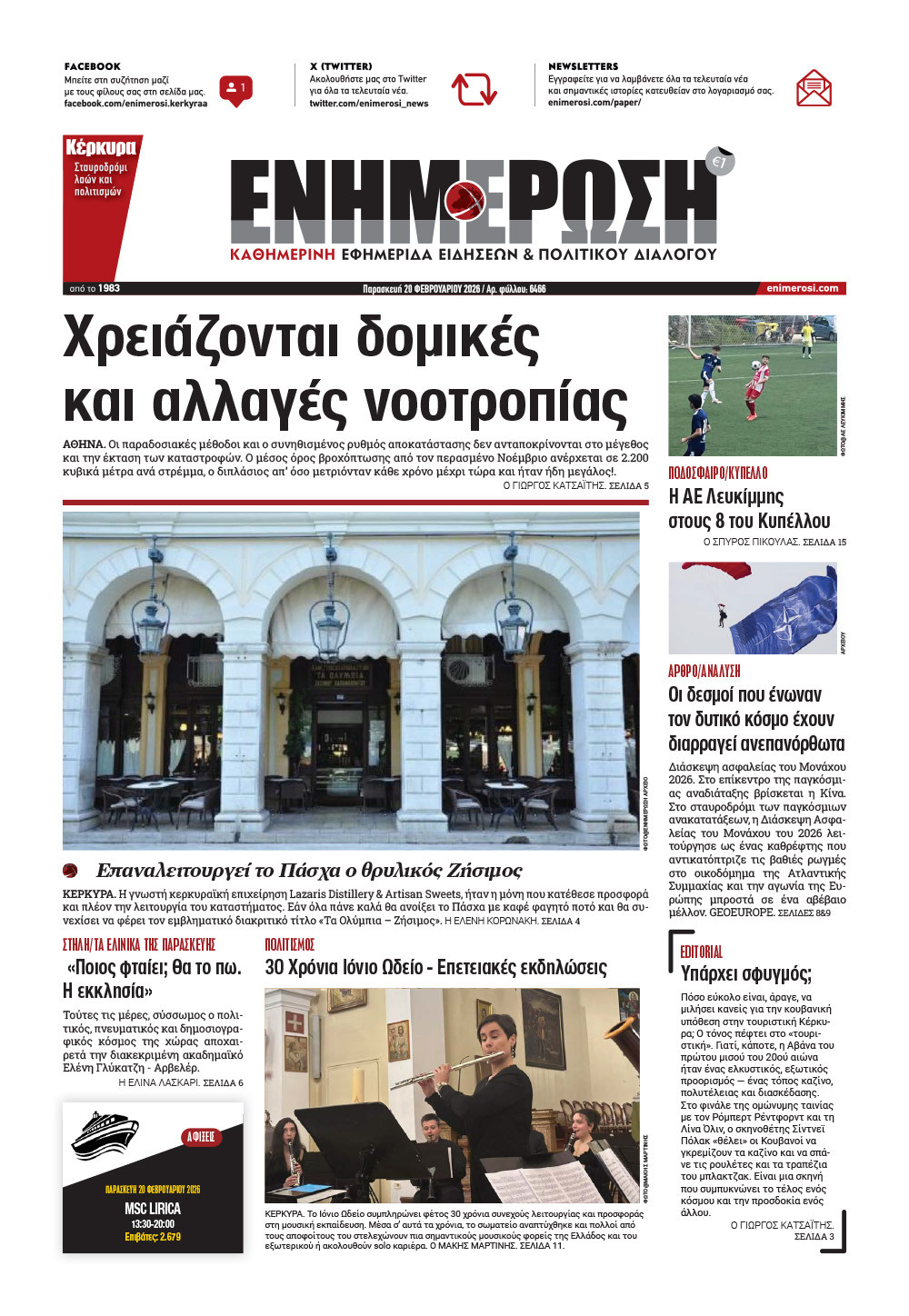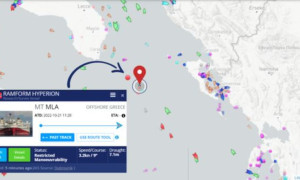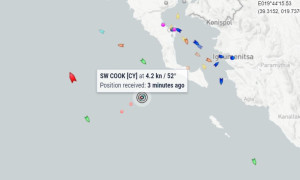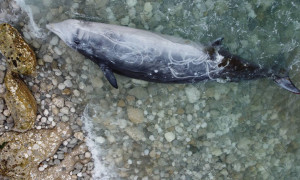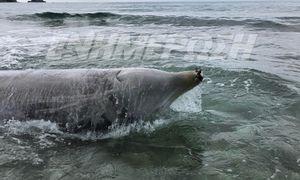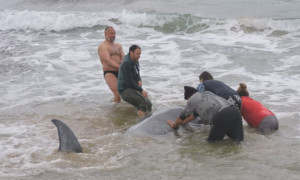Second marine hydrocarbon exploration in North Ionian Sea completed
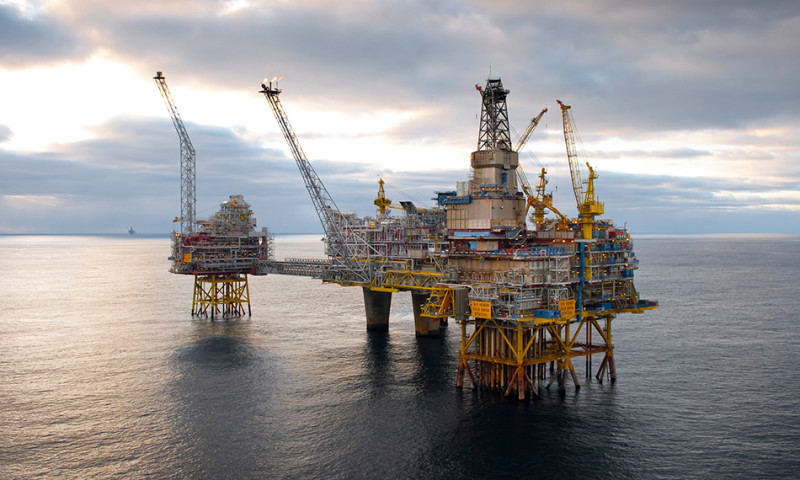
seismic survey
09 Mar 2022
/ 18:38
“The seismic surveys are not linked to the beached beaked whales in Corfu,” said the Hellenic Hydrocarbon Resources Management (EDEY) CEO Aristophanes Stefatos.
The international company for acquisition and processing of marine geophysical data Shearwater completed the second marine geophysical (seismic) exploration in the North Ionian Sea on behalf of the company Hellenic Petroleum (ELPE).
The Hellenic Hydrocarbon Resources Management (EDEY) said that this exploration programme is a continuation of the explorations completed at the beginning of February 2022 in the South Ionian Sea. These explorations, the aim of which was to assess the size of the country's potential gas deposits, are coming at a critical time when energy costs are rising globally and we are focusing on strategic security of supply issues.
The next step in the procedure is to process the collected data in order to analyse and evaluate it. The quality and speed of implementation of the work that needs to be done next is a priority, in order for the relevant investment decisions for the specific regions to mature.
The data published by EDEY
Field of explorations: Ionian Sea, Ionian Block, 6,671 km2 area, Administrator: Hellenic Petroleum.
Environmental protection measures implemented:
- Use of the ‘soft-start’ procedure to ensure that marine mammals can be temporarily removed from the geophysical exploration area prior to the start of the exploration.
- Doubling of the number of marine mammal observers on the vessel conducting the seismic surveys to ensure the protection of cetaceans and other marine life within the safety zone.
- Doubling of the radius of the safety zone up to 1.5km around the vessel that carried out the seismic surveys in case of detection of large marine animals.
- Waiting period of 30 minutes before the start of the exploration and cessation of all search activity.
- Passive acoustic monitoring of underwater sounds to measure marine noise levels and detect marine mammals.
- Implementation of a 1km exclusion zone around ‘Natura’ areas, as well as fish farms.
- Land and aerial monitoring of cetaceans during and after surveys.
- Environmental monitoring of wildlife sanctuaries, including telemetry monitoring of caretta caretta turtles with GPS tracking devices.
- Full compliance with all applicable regulations and guidelines in accordance with the MARPOL VI Convention, the ACCOBAMS Agreement and the JNCC guidelines.
The beached beaked whales in Corfu
It is worth noting that regarding the incident of the three beached beaked whales at the Arillas and Agios Gordios beaches, the Hellenic Hydrocarbon Resources Management (EDEY) CEO Aristophanes Stefatos had recently stated that “It is important to clarify that this traumatic and sad incident is not directly linked to the seismic surveys in the area. As the experts and environmental organisations themselves had reported, there is no evidence to confirm that the beaked whales were washed ashore due to the ongoing seismic surveys.”
EDEY said that seismic surveys have been carried out since January with no other incidents. It is worth noting that, following the completion of the surveys to confirm that there were no other beached beaked whales, there was an aerial inspection of the coast in the Gulf of Kyparissia. On the contrary, it is also worth noting that marine animals had been washed ashore in the area in the past as well (in 1996, 1997 and 2011) to a much greater extent during periods when no seismic surveys were carried out.
Sharp increase in marine traffic
Although human activity has potential impact on marine life, there is no evidence that the cetaceans that are being washed ashore are associated with seismic surveys. They are associated with military exercises and the sudden use of high-frequency sonar or other major marine incidents. Despite the fact that we have reliable information about the operation of a powerful sonar system, EDEY is unable to confirm any military exercise in the area. In any case, we should remind the incident with the burning Euroferry Olympia near Corfu, which led to a sharp increase in marine traffic during rescue efforts.
Being fully aware of the potential impact of human activities on marine life, EDEY ensures the implementation and compliance with the protection measures provided for in the approved Environmental Action Plans. In this particular case, the responsible companies have taken some additional protection measures that not only meet the standards set out in legislation and the best international practices, but in some cases they far exceed these standards.
In conclusion, seismic surveys have been carried out continuously for many decades around the world. There is no evidence that these surveys are responsible for the beached beaked whales. Seismic surveys in Greece have been conducted since January without any other incidents. The protection of our country's marine environment and marine life is a national priority, which is why all the activities concerned are carried out in ways that go beyond the best international practices. Protecting our country's energy supply, energy independence and energy costs are also priorities.
The opposition
We are, of course, aware that there are organisations that are demanding that we immediately stop using gas, but this is simply not realistic. The demand in Greece for gas in 2021 was 6.5 bcm and this is expected to increase to 9.5 bcm by 2030. What is realistic, however, and it is a clearly stated national objective that EDEY fully supports, is to speed up the transition to a more sustainable and cleaner energy mix. There is now universal acceptance amongst experts that, in order to achieve this goal as quickly as possible and in a way that protects against energy dependence and costs, gas will play a critical role.
The EDEY CEO also said “I hope that this brief commentary will remove any concern and that it is now clear that all these important priorities – both the protection of the marine environment and the protection of the country's energy supply – can be achieved at the same time.”
The Hellenic Hydrocarbon Resources Management (EDEY) said that this exploration programme is a continuation of the explorations completed at the beginning of February 2022 in the South Ionian Sea. These explorations, the aim of which was to assess the size of the country's potential gas deposits, are coming at a critical time when energy costs are rising globally and we are focusing on strategic security of supply issues.
The next step in the procedure is to process the collected data in order to analyse and evaluate it. The quality and speed of implementation of the work that needs to be done next is a priority, in order for the relevant investment decisions for the specific regions to mature.
The data published by EDEY
Field of explorations: Ionian Sea, Ionian Block, 6,671 km2 area, Administrator: Hellenic Petroleum.
Environmental protection measures implemented:
- Use of the ‘soft-start’ procedure to ensure that marine mammals can be temporarily removed from the geophysical exploration area prior to the start of the exploration.
- Doubling of the number of marine mammal observers on the vessel conducting the seismic surveys to ensure the protection of cetaceans and other marine life within the safety zone.
- Doubling of the radius of the safety zone up to 1.5km around the vessel that carried out the seismic surveys in case of detection of large marine animals.
- Waiting period of 30 minutes before the start of the exploration and cessation of all search activity.
- Passive acoustic monitoring of underwater sounds to measure marine noise levels and detect marine mammals.
- Implementation of a 1km exclusion zone around ‘Natura’ areas, as well as fish farms.
- Land and aerial monitoring of cetaceans during and after surveys.
- Environmental monitoring of wildlife sanctuaries, including telemetry monitoring of caretta caretta turtles with GPS tracking devices.
- Full compliance with all applicable regulations and guidelines in accordance with the MARPOL VI Convention, the ACCOBAMS Agreement and the JNCC guidelines.
The beached beaked whales in Corfu
It is worth noting that regarding the incident of the three beached beaked whales at the Arillas and Agios Gordios beaches, the Hellenic Hydrocarbon Resources Management (EDEY) CEO Aristophanes Stefatos had recently stated that “It is important to clarify that this traumatic and sad incident is not directly linked to the seismic surveys in the area. As the experts and environmental organisations themselves had reported, there is no evidence to confirm that the beaked whales were washed ashore due to the ongoing seismic surveys.”
EDEY said that seismic surveys have been carried out since January with no other incidents. It is worth noting that, following the completion of the surveys to confirm that there were no other beached beaked whales, there was an aerial inspection of the coast in the Gulf of Kyparissia. On the contrary, it is also worth noting that marine animals had been washed ashore in the area in the past as well (in 1996, 1997 and 2011) to a much greater extent during periods when no seismic surveys were carried out.
Sharp increase in marine traffic
Although human activity has potential impact on marine life, there is no evidence that the cetaceans that are being washed ashore are associated with seismic surveys. They are associated with military exercises and the sudden use of high-frequency sonar or other major marine incidents. Despite the fact that we have reliable information about the operation of a powerful sonar system, EDEY is unable to confirm any military exercise in the area. In any case, we should remind the incident with the burning Euroferry Olympia near Corfu, which led to a sharp increase in marine traffic during rescue efforts.
Being fully aware of the potential impact of human activities on marine life, EDEY ensures the implementation and compliance with the protection measures provided for in the approved Environmental Action Plans. In this particular case, the responsible companies have taken some additional protection measures that not only meet the standards set out in legislation and the best international practices, but in some cases they far exceed these standards.
In conclusion, seismic surveys have been carried out continuously for many decades around the world. There is no evidence that these surveys are responsible for the beached beaked whales. Seismic surveys in Greece have been conducted since January without any other incidents. The protection of our country's marine environment and marine life is a national priority, which is why all the activities concerned are carried out in ways that go beyond the best international practices. Protecting our country's energy supply, energy independence and energy costs are also priorities.
The opposition
We are, of course, aware that there are organisations that are demanding that we immediately stop using gas, but this is simply not realistic. The demand in Greece for gas in 2021 was 6.5 bcm and this is expected to increase to 9.5 bcm by 2030. What is realistic, however, and it is a clearly stated national objective that EDEY fully supports, is to speed up the transition to a more sustainable and cleaner energy mix. There is now universal acceptance amongst experts that, in order to achieve this goal as quickly as possible and in a way that protects against energy dependence and costs, gas will play a critical role.
The EDEY CEO also said “I hope that this brief commentary will remove any concern and that it is now clear that all these important priorities – both the protection of the marine environment and the protection of the country's energy supply – can be achieved at the same time.”



